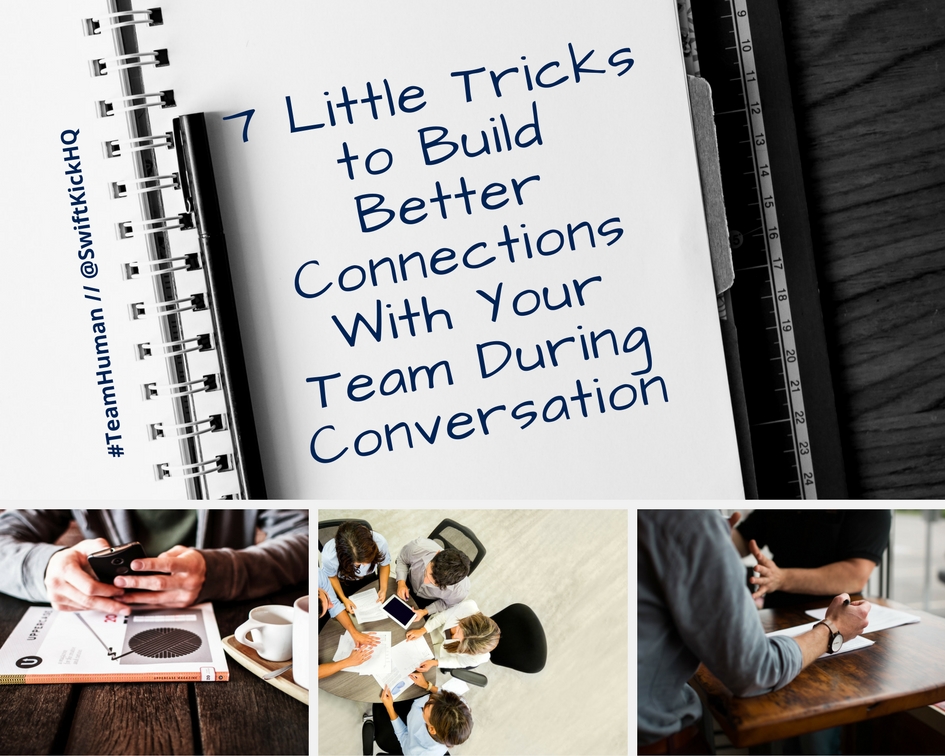In every team I have been in, the number one thing that sets a good team apart from a bad one is their level of communication. I’m not talking about keeping in touch with your team members about your projects. I’m talking about whether or not you feel a connection with your team at the end of a conversation. Do you feel like your relationships grow, or do people just stay acquaintances?
 I met some of my closest friends through class projects. I met my best friend when we were on a team doing community service in Baltimore, Maryland, revitalizing community gardens. We instantly clicked and became close friends because of the conversations we had.
I met some of my closest friends through class projects. I met my best friend when we were on a team doing community service in Baltimore, Maryland, revitalizing community gardens. We instantly clicked and became close friends because of the conversations we had.
Here are 7 little tricks that can help you to instantly create better connections with your teammates:
1. Say their name
In Dale Carnegie’s book “How to Win Friends and Influence People,” he dedicated an entire chapter to this topic for a good reason. People have been conditioned to love one word and one word only, their name. If you say someone’s name, it shows that the person you are talking to is an individual who matters.
It’s as simple as changing “do you have the time?’ to “Sam, do you have the time?”
Or, “Let’s get some coffee.” to “Let’s get some coffee, Kim.”
2. Mirror Their Voice and Diction
You might have heard of the term “mirroring” before. It’s when you are in a conversation, and you suddenly copy the other person’s body language. If they cross their arms, you cross your arms. When they sit down, you sit down. If they turn to look at something, you turn to look, too. Forbes magazine has said that mirroring helps people to nail an interview. It’s like a Jedi mind trick.
People might not know that you are also supposed to mirror the other person’s voice and diction. If they talk loudly, you talk loudly. When they talk with a slow pace, you talk with a slow pace. If they use a lot of slang, you use a lot of slang. Of course, you don’t want to compromise your identity over this and come across as fake. Mirror their body language, voice, and diction, but make sure to still stay true to yourself.
3. Show Appreciation
It’s as simple as it sounds. Be kind and show that you care. Become your teammates’ biggest fan. If they do a great job, tell them. They will love that you noticed their work and will feel like you really care not only about their work, but about them as a friend.
4. Show Interest
Just like showing appreciation, you can show a general interest in a person. People are more than your teammates; they have their own life. Ask about what they do outside of work. Do they have any hobbies or fun facts?
Dale Carnegie once said, “It’s better to be interested than interesting.” If you show that you care, they will care about you and a bond will form. A connection with your teammates will form when you take an interest in their life outside of the professional world.
5. Delay Your Smile
Everyone knows that you should smile in a conversation. When you smile, you seem more engaged, more friendly, and more approachable. I mean, that’s nice and all, but that’s basic information. I can tell you how to instantly make your smile 10 times more effective. Are you ready?
Delay your smile!
When you see a teammate, take a second and just look at the person. Now you can smile. This small delay shows that the reason you are smiling is because you saw them.
“I wasn’t happy before, but now that you’re here, my day has been brightened up.”
6. Be Unique
You don’t want to be the 5th person of the day who has asked your teammate “how are you?” So, be unique and have a different type of conversation. Put some sprinkles of extraordinary topics in there.
Talk about people’s passions, favorite cereals, funny cat videos, Pepsi or Coke. (Side note, when you come to a conclusion as to what is the better beverage, comment below. I have an internal conflict between the two, and I need to settle the dispute once and for all.)
There are many ways to be unique. You can live an interesting life or ask interesting questions. One simple thing I do is to have surprising answers to generic questions. If people ask me how I’m doing, I will tell them that I am thriving, or I am jubilicious. I promise, jubilicious is a word. If people ask me how my day is going, I’ll just tell them it’s going, but it’s not gone yet. If people ask me for the time, I tell them its daytime or nighttime.
These answers might not make sense or seem corny, but that’s not the point. The point is to have interactions that are abnormal. We don’t want to be just another person. We are unique, and so are our teammates, so the interactions should be unique, too.
7. Remember Things About Them
Another way to show interest is to make sure you remember things about your teammates. The simplest way is to remember their birthdays. I keep birthdays on my calendar. Almost every day, I send out a happy birthday text to someone.
I also use the notes section in my phone contacts, so when I learn something about that person, I jot it down. I make to-dos to follow up with people about topics we talked about. For example, my friend was trying to read a section of the Bible every day. When I followed up with her to ask if she did her daily reading, she instantly lit up with happiness because she didn’t know I cared that much.
Friends, Not Teammates
There are a lot of ways that we can establish a connection with our teammates. You may have noticed I have been using the words “teammate” and “friend” interchangeably. The foundation of a team is the trust we build with our teammates. Trust is something that comes effortlessly with friends. If we want a thriving and effective team, we have to be connected. They are our friends, not just our colleagues.



